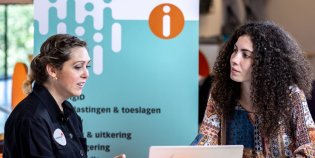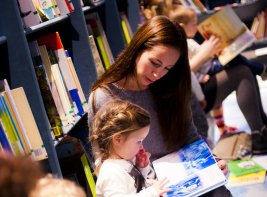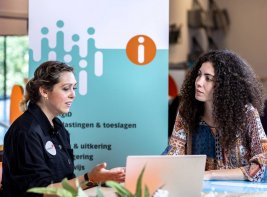The Digital Inclusion programme helps us support public libraries with setting up services for people who have difficulties with the digital government. On the one hand, we try to make people as self-reliant as possible by making them more digitally literate so they can better participate in everyday society. On the other hand, we offer help by providing information about government sites or referring them to local partners for personal queries.
Digital Inclusion programme
We use the Digital Inclusion programme to support public libraries with setting up services for various vulnerable target groups who have difficulties with the digital government. These groups could include, for example, the elderly, young people, those with low literacy and new residents in the Netherlands. Services in the libraries include:
- digital literacy courses (such as Klik & Tik and Digisterker)
- the Digital Government Information Point (IDO). This is where people can get information on things such as taxes, benefits, DigiD, E-health, donor registration and COVID checks and vaccinations. They can also get help with personal queries. The library works with local partners in this regard.
The KB supports these libraries in various ways, such as the national-level purchase of digital literacy courses, training of library staff, research and marketing. The Digital Inclusion programme is a collaboration between public service providers (government implementing organisations), the Ministry of the Interior and Kingdom Relations, and the KB.
What’s the purpose of the Digital Inclusion programme?
We use the programme to contribute to a digitally inclusive society. This is a society where everyone can participate. And where there is always an alternative to digital contact, such as a physical help point like the IDO.
The Digital Inclusion programme thereby fits in well with the further development of the broad social library: a library that offers solutions to many social issues. The programme is therefore included in the Library Covenant 2020-2023, which took effect on 30 September 2020. The covenant includes six parties: VNG, IPO, OCW, VOB, KB and SPN.
What have we achieved so far?
- Klik&Tik courses from Oefenen.nl and 'Working with e-government' courses from Digisterker are held in more than 400 libraries.
- Almost all libraries hold digital consultation hours for help with mobile phones, computers or tablets.
- There were already 430 IDOs as of January 2022.
- Almost all libraries offer assistance with questions about donor registration or COVID.
More information on Digital Inclusion
Want to know more about the Digital Inclusion programme? Visit the Bnetwerk page.



